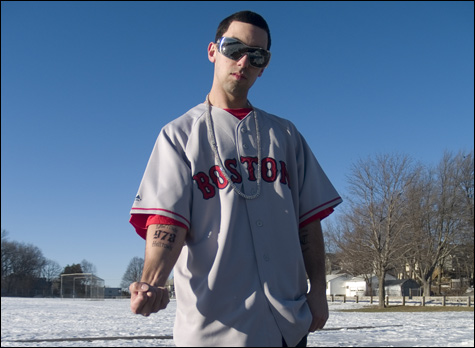
THAT WAS YOU? "Seeing that Dilla did all those early Tribe beats, I guess I was a fan before I even knew it." |
Extraordinarily missed Detroit beat stylist J Dilla (a/k/a Jay Dee) was righteously benevolent. In interviews, he rarely trashed major labels that shelved his gems for lacking so-called mainstream appeal. As a rapper — even when he popped shit — it was in a joking manner. And as a producer, he used his skills and his reputation to nurture rising talents rather than to half-bake records for the daughters of pro wrestlers and heavy-metal icons.So though many of his devout homeboys and legionnaires may resent the relentless shout-outs and merchandising that bear his name, it's unlikely that Dilla — who died three years ago in February — would be much bothered (except, maybe, by that godawful commemorative wristwatch). Instead, he would probably embrace new devotees like Termanology, who, as they say in hip-hop, is a motherfucking beast, and, more important, recently dropped If Heaven Was a Mile Away — a mixtape featuring his smooth Latino venom injected into a smorgasbord of rare Dilla feats and fan favorites.
"I didn't really understand his importance until he died," e-mails Term, whose phone wasn't working from Slovenia, where he was on tour this past week with Big Shug and Dilla's former group, Slum Village. "I knew Dilla more from his newer work with Busta Rhymes and Common, but seeing that he did all those early A Tribe Called Quest beats, I guess I was a fan before I even knew it."
Jay Dee's initial big body of commercial work — which included Tribe's "1nce Again" and "Runnin' " by the Pharcyde (Term's favorite) — dropped before pedestrians cared about who produced tracks. He was an industry favorite, but casual rap fiends didn't establish a first-name relationship till Dilla released Champion Sound with Madlib in 2003. ("The Red," by the way, might be the tightest rap beat ever spun.)
For Heaven, whose release Term celebrates at the Middle East next Saturday, the razor-tongued Lawrence-bred MC meticulously chose 17 beats to stomp on. Not all Dilla cuts are wax-able — what with the smack-tastic cross-rhythms, the piercing synth, and bass lines that rattle car alarms for miles, some were just meant to ride without lyrics, as on his four posthumous instrumental projects.
"I would never rhyme on half of the beats on Donuts," Term writes, referring to the remarkable 2006 snippet farm that gave outsiders their first glance into the elusive Dilla cassette reels that got passed among rappers in the beat market. On "Say It," which floats on a jingly and whimsical stroke of Oriental genius from Dilla's "Jay Love Japan," Term enlists Saigon, Freeway, Bun B, Sheek Louch, and Joell Ortiz. And though it's exciting enough to see such a diverse cross-coastal mix of explosive outlaws congregating in the name of rap's most subtle wizard, it's also a testament to how Dilla's music — though often artificially overstated by whiteboys with Slum Village stickers on their snowboards — transcends the stylistic partitions that have grown only taller and wider since his passing.